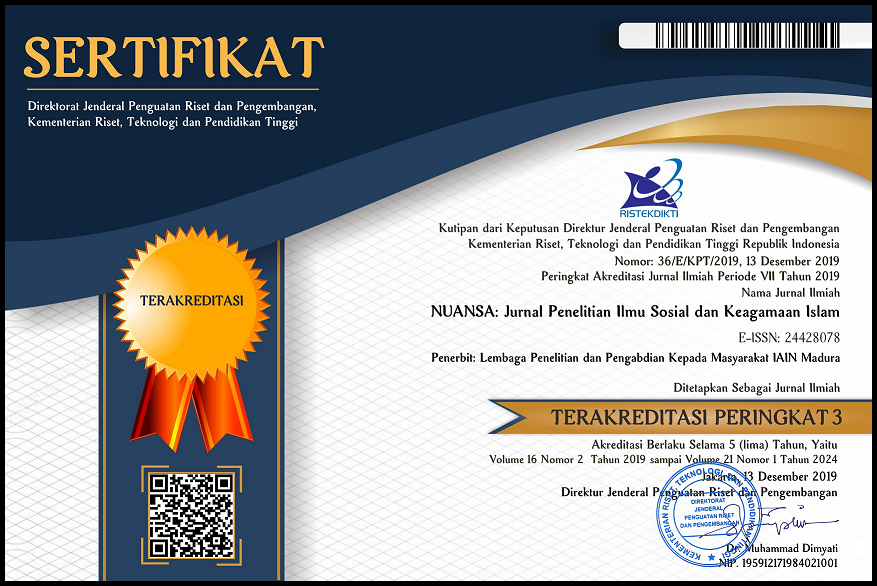Strategi Bertahan Kelompok Minoritas Agama Menghadapi Diskriminasi: Pengalaman Jemaat Ahmadiyah Indonesia Banjarnegara Jawa Tengah
 Abstract views: 705
,
Abstract views: 705
,
 pdf downloads: 572
pdf downloads: 572
Abstract
After the Ahmadiyya was sentenced as a heretical group outside Islam in 2005 and restrictions on the spread of its doctrines in 2008, in 2018 the Indonesian Ahmadiyya Community (JAI) experienced restrictions on their activities in Banjarnegara, Central Java due to resistance from the number of dominant Islamic organizations and prohibitions from the local district government. In discussing this, this article describes the discrimination received by the Ahmadiyya group in Banjarnegara according to the historical and developmental timelines and the Banjarnegara JAI's strategy to be able to maintain its existence. Based on qualitative research, this article shows that discrimination against Ahmadiyya in Banjarnegara was closely related to the fatwa that mentions Ahmadiyya as a group outside Islam or heretical and concerns of dominant Islamic groups over the spread of Ahmadiyya doctrines. To maintain its existence, the Ahmadiyya group has taken advantage of the structure of political opportunities available in the region where their new activities were located and social capital formed through collective identity, as well as reaching out to the community with framed humanism-altruistic activities. The region which was the new location for their activities has a relatively tolerant of political structure and society towards religious minority groups such as the Ahmadiyya. As an organization that already has several branches, the group also has taken advantage of social networks that had been formed historically.
(Setelah Ahmadiyah sempat divonis sebagai kelompok sesat di luar Islam pada tahun 2005 dan pembatasan penyebaran ajarannya pada tahun 2008, pada tahun 2018 Jemaat Ahmadiyah Indonesia (JAI) mengalami pembatasan aktivitas mereka di Banjarnegara, Jawa Tengah karena adanya resistensi dari jumlah ormas Islam dominan dan larangan dari pemerintah kabupaten setempat. Artikel ini bertujuan untuk mengkaji dinamika diskriminasi yang dialami Jemaat Ahmadiyah Indonesia (JAI) di Banjarnegara dan strategi mereka dalam menghadapinya. Dalam membahas hal tersebut, artikel ini memaparkan diskriminasi yang diterima oleh kelompok Ahmadiyah di Banjarnegara sesuai dengan kronologi sejarah dan perkembangan serta strategi JAI Banjarnegara untuk dapat mempertahankan eksistensinya. Artikel ini, berdasarkan penelitian kualitatif, menunjukkan bahwa diskriminasi terhadap Ahmadiyah di Banjarnegara erat kaitannya dengan fatwa yang menyebut Ahmadiyah sebagai kelompok di luar Islam atau sesat dan kekhawatiran kelompok Islam dominan atas penyebaran doktrin Ahmadiyah. Untuk mempertahankan eksistensinya, kelompok Ahmadiyah memanfaatkan struktur peluang politik yang ada di wilayah tempat aktivitas baru mereka berada dan modal sosial yang terbentuk melalui identitas kolektif, serta menjangkau masyarakat dengan kegiatan berbingkai humanisme-altruistik. Wilayah yang menjadi lokasi baru kegiatan mereka memiliki struktur politik dan masyarakat yang relatif toleran terhadap kelompok minoritas agama seperti Ahmadiyah. Sebagai organisasi yang sudah memiliki sejumlah cabang, mereka juga memanfaatkan jejaring sosial yang telah terbentuk secara historis.)
Downloads
References
Ahmad, Sufni. “Bab III Masuknya Ajaran Ahmadiyah Di Banjarnegara,” 2004. https://arsip.isa.web.id/200/skripsi-sufni-ahmad-bab3.html#fnref:5.
Alnizar, Fariz. “Pretext for Religious Violence in Indonesia: An Anthropolinguistic Analysis of Fatwas on Ahmadiyya.” Studia Islamika 26, no. 3 (2019): 417–44. https://doi.org/10.36712/sdi.v26i3.8719.
Breidlid, Torhild. “The Legitimazation of Violence Against the Ahmadiyya Community in Indonesia.” Jurnal Kawistara 3, no. 2 (2013): 165–77. https://doi.org/10.22146/kawistara.3979.
Burhani, Ahmad Najib. “It’s a Jihad: Justifying Violence towards the Ahmadiyya in Indonesia.” TRaNS: Trans-Regional and -National Studies of Southeast Asia 9, no. 1 (2021): 99–112. https://doi.org/10.1017/trn.2020.8.
———. “Treating Minorities with Fatwas: A Study of the Ahmadiyya Community in Indonesia.” Contemporary Islam 8, no. 3 (2014): 285–301. https://doi.org/10.1007/s11562-013-0278-3.
Fox, Jonathan. The Unfree Exercise of Religion: A World Survey of Discrimination against Religious Minorities. Cambridge: Cambridge University Press, 2016.
Grim, Brian J., and Roger Finke. The Price of Freedom Denied: Religious Persecution and Conflict in the Twenty-First Century. Cambridge: Cambridge University Press, 2010.
Hartono, Uje. “Pemkab Banjarnegara Layangkan SP 3 Minta Ahmadiyah Setop Aktivitas.” Detik News, 2018. https://news.detik.com/berita-jawa-tengah/d-4052360/pemkab-banjarnegara-layangkan-sp-3-minta-ahmadiyah-setop-aktivitas.
Hicks, Jacqueline. “Heresy and Authority: Understanding the Turn against Ahmadiyah in Indonesia.” South East Asia Research 22, no. 3 (2014): 321–39. https://doi.org/10.5367/sear.2014.0216.
Irawan, Andi Muhammad. “‘They Are Not Muslims’: A Critical Discourse Analysis of the Ahmadiyya Sect Issue in Indonesia.” Discourse and Society 28, no. 2 (2017): 162–81. https://doi.org/10.1177/0957926516685462.
Iskandar, Nanang RI. Dasawindu Gerakan Ahmadiyah Indonesia 1928-2008. Cetakan 1. Jakarta: Darul Kutubil Islamiyah, 2008.
Jemaat Ahmadiyah Indonesia. Bungan Rampai Sejarah Ahmadiyah Indonesia 1925-2000. Bogor: Jemaat Ahmadiyah Indonesia, 2000.
Kantor Kementerian Agama Kabupaten Banjarnegara. “Bupati Dan Kakankemenag Terima Pernyataan Sikap Ahmadiyah.” Kantor Kementerian Agama Kabupaten Banjarnegara, 2018. https://jateng.kemenag.go.id/2018/04/bupati-dan-kakankemenag-terima-pernyataan-sikap-ahmadiyah-2/.
Mursyidi, Ach. Fatayillah, Zainal A. Bagir, and Samsul Maarif. “Homo Sacer: Ahmadiyya and Its Minority Citizenship (A Case Study of Ahmadiyya Community in Tasikmalaya).” Wawasan: Jurnal Ilmiah Agama Dan Sosial Budaya 5, no. 2 (2020): 191–204. https://doi.org/10.15575/jw.v5i2.9402.
Muzaki, Khoirul. “MUI Banjarnegara Desak Bupati Hentikan Kegiatan Jemaat Ahmadiyah.” Tribun Jateng, 2018. https://jateng.tribunnews.com/2018/05/08/mui-banjarnegaradesak-bupati-hentikan-kegiatan-jemaat-ahmadiyah.
Radar Banyumas. “Bupati Banjarnegara Kembali Ultimatum Ahmadiyah.” Radar Banyumas, 2018. https://radarbanyumas.co.id/bupati-banjarnegara-kembali-ultimatum-ahmadiyah/.
Rahman, Fatima Zainab. “State Restrictions on the Ahmadiyya Sect in Indonesia and Pakistan: Islam or Political Survival?” Australian Journal of Political Science 49, no. 3 (2014): 408–22. https://doi.org/10.1080/10361146.2014.934656.
Regus, Max. “A Pseudo-Secular Space, Religious Minority and Reasons for Exclusion: The Ahmadiyya Minority Group in Contemporary Indonesia.” Politics and Religion Journal 13, no. 1 (2019): 39–54. https://doi.org/10.54561/prj1301039r.
———. Human Rights Culture in Indonesia: Attacks on the Ahmadiyya Minority Group. Berlin: De Gruyter, 2021.
———. “The Victimization of the Ahmadiyya Minority Group in Indonesia: Explaining the Justifications and Involved Actors.” Religious: Jurnal Studi Agama-Agama Dan Lintas Budaya 4, no. 4 (2020): 227–38. https://doi.org/10.15575/rjsalb.v4i4.10256.
Sugiarto, Bowo. “Demokrasi, Agama, Dan Negara Di Indonesia Pasca-Soeharto.” In Demokrasi Tanpa Demos: Refleksi 100 Ilmuwan Sosial Politik Tentang Kemunduran Demokrasi Di Indonesia, edited by Wijayanto, Aisah Putri Budiatri, and Herlambang P. Wiratraman, 3–14. Jakarta: Pustaka LP3ES, 2021.
Tarrow, Sidney. “States and Opportunities: The Political Structuring of Social Movements.” In Comparative Perspectives on Social Movements: Political Opportunities, Mobilizing Structures, and Cultural Framings, edited by Doug McAdam, John D. McCharty, and Mayer N. Zald, 41–61. Cambridge: Cambridge University Press, 1996.
Wiyoko, Hanan. “Politik Identitas Jemaat Ahmadiyah Indonesia (JAI) Di Kabupaten Banyumas.” Universitas Jenderal Soedirman, 2010.
Yang, Fenggang. “Oligopoly Dynamics: Consequences of Religious Regulation.” Social Compass 57, no. 2 (2010): 194–205. https://doi.org/10.1177/0037768610362417.
———. “Oligopoly Is Not Pluralism.” In Religious Pluralism: Framing Religious Diversity in the Contemporary World, edited by Giordan Giuseppe and Enzo Pace, 49–59. Springer, 2014.
Zald, Mayer N. “Culture, Ideology, and Strategic Framing.” In Comparative Perspectives on Social Movements: Political Opportunities, Mobilizing Structures, and Cultural Framings, edited by Doug McAdam, John D. McCarthy, and Mayer N. Zald, 261–74. Cambridge: Cambridge University Press, 1996.
Zulkarnain, Iskandar. Gerakan Ahmadiyah Di Indonesia. Yogyakarta: LKiS, 2005.
The journal operates an Open Access policy under a Creative Commons Attribution-NonCommercial 4.0 International License (CC-BY-NC) 
Authors who publish with this journal agree to the following terms:
- Authors retain copyright and grant the journal right of first publication with the work simultaneously licensed under a Creative Commons Attribution License that allows others to share the work with an acknowledgement of the work's authorship and initial publication in this journal.
- Authors are able to enter into separate, additional contractual arrangements for the non-exclusive distribution of the journal's published version of the work (e.g., post it to an institutional repository or publish it in a book), with an acknowledgement of its initial publication in this journal.
- Authors are permitted and encouraged to post their work online (e.g., in institutional repositories or on their website) prior to and during the submission process, as it can lead to productive exchanges, as well as earlier and greater citation of published work.





















